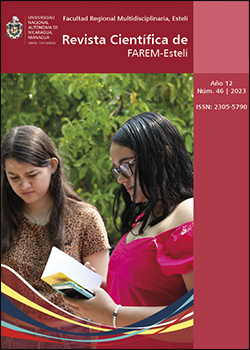Psychosocial factors related to eating habits and lifestyles in diabetic persons. Municipality of Achuapa, León. Nicaragua
DOI:
https://doi.org/10.5377/farem.v12i46.16473Keywords:
Depression, diabetes, stress, lifestyles, psychosocial factorsAbstract
Worldwide, the World Health Organization estimates that more than 346 million people have diabetes, and it is estimated that this figure will double by the year 2030 if the current trend continues. The objective of this research was to analyze the psychosocial factors related to eating habits and lifestyle in diabetic patients in the municipality of Achuapa, León Nicaragua, January-February 2023. A cross-sectional analytical design methodology was applied. An interview was used for data collection, which also included physical examination, laboratory tests (fasting blood glucose, lipid profile, creatinine) and instruments such as the Multidimensional Scale of Perceived Social Support (EMAS) and the Stress Evaluation Scale for Diabetics (EED) (Polonsky), among others. The aim was to determine psychosocial factors such as stress, perceived social support, depression and adherence to treatment. The data were analyzed with SPSS V25 software using statistical tools such as frequencies and Odds Ratio. The results show that the prevalence of depression is high, particularly moderate depression with a bidirectional relationship with altered glycemia, perceived social support in which moderate support prevailed. Likewise, with the levels of stress found; high consumption of carbohydrates and fried foods and low consumption of fruits, vegetables and water prevailed, which affects the control of diabetes. It was possible to associate altered glycemia with depression by means of the Odds Ratio tool, achieving statistical significance, constituting a risk as with dyslipidemia.
Downloads
References
Caro-Bautista, J., Morilla-Herrera, J., Villa-Estrada, F., Cuevas-Fernández, M., Lupiáñez-Pérez, I., & Morales-Asencioa, J. (2016). Adaptación cultural al español y validación psicométrica del Summary of Diabetes Self-Care Activities measure (SDSCA) en personas con diabetes mellitus tipo 2 en Atención primaria. ELSEVIER, Atención Primaria vol 48, 48(7), 458-467.
Díaz-Rodríguez, G., Reyes-Morales, H., López-Caudana, A. E., Caraveo-Anduaga, J., & Atrián-Salazar, M. L. (2006). Validación de una escala clinimétrica para el diagnóstico de depresión en pacientes con diabetes mellitus tipo 2, en unidades de atención primaria. Revista de Investigación Clínica, 58(5), 432-440.
Eccoña Espinoza, J. (2020). Factores psicosociales asociados a la adherencia terapéutica en pacientes con diabetes tipo 2 atendidos en el consultorio externo del Hospital Maria Auxiliadora durante el periodo de diciembre-enero 2020. Lima, Perú.
García Ortiz, Y., Casanova Expósito, D., & Raymond Álamo, G. (2020). Estrés, apoyo social y representación de la enfermedad en pacientes con diabetes mellitus. Revista Cubana de Endocrinología, 31(1), 62-78.
Gómez Díaz, S., & González Zelaya, A. (2019). Salud mental de pacientes con diabetes mellitus que asisten a la fundación nicaragüense para la diabetes, en el periodo abril-agosto del 2018. Nicaragya.
Jiménez, M. d. (29 de Agosto de 2020). Influencia del estrés en la diabetes mellitus. NPunto, 3(29), 91-124.
Majid, A., Bashet, A., Siddique, R. F., & Rahman, E. (2019). Association between dietary habit and diabetic risk profiles among diagnosed Type-2 diabetic patients in a selected area of Bangladesh. Diabetes Metab Syndr Clin Res, 13(2), 1633-7.
Matrángolo, G., Simkin, H., & Azzollini, S. (2022). Evidencia de Validez de la Escala Multidimensional de Apoyo Social Percibido (EMAS) en población adulta argentina. Rev. CES Psicología, 15(1), 163-181.
MINSA, M. d. (2017). Protocolo de Atención de la Diabetes Mellitus. Gobierno de Nicaragua.
Ofman, S. D., Taverna, M. J., & Stefani, D. (2019). Importancia de considerar los factores psicosociales en la diabetes mellitus tipo 2. Revista Cubana de Endocrinología, 30(2), 1-19.
Ortiz, M. S., Baeza-Rivera, M. J., & Myers, H. F. (2015). Propiedades Psicométricas de la Escala de Estrés para Diabéticos En una Muestra de Pacientes Diabéticos Tipo II Chilenos. Terapia Psicológica, 31(3), 281-286.
PAHO. (2021). Organización Panamericana para la Salud. Obtenido de La diabetes muestra una tendencia ascendente en las Américas: https://www3.paho.org/hq/index.php?option=com_content&view=article&id=7453:2012-diabetes-shows-upward-trend-americas&Itemid=1926&lang=es#:~:text=A%20nivel%20mundial%2C%20la%20OMS,las%20Am%C3%A9ricas%20y%20el%20mundo.
Palamenghi, L., Carlucci, M. M., & Graffigna, G. (2020). Measuring the Quality of Life in Diabetic Patients: A Scoping Review. Journal of Diabetes Research, 6(5), 19.
Torres Lucero, M., & Canchari Aquino, A. (2020). Relación de hábitos alimentarios, indicadores antropométricos y metabólicos en pacientes adultos con diabetes mellitus tipo II de un centro de salud de Ucayali. Obtenido de Universidad Peruana Unión: http://hdl.handle.net/20.500.12840/3137
Vinaccia, S., & Bernal Guerrero, S. (2021). Calidad de vida y depresión en pacientes con diagnóstico de Diabetes tipo 2. Cuadernos Hispanoamericanos De Psicología, 21(1), 1-15.
Published
Issue
Section
License
Copyright (c) 2023 Revista Científica de FAREM-Esteli

This work is licensed under a Creative Commons Attribution-NonCommercial-ShareAlike 4.0 International License.



